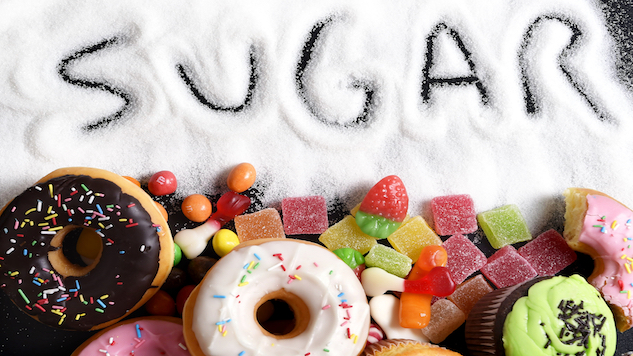THE TRUTH ABOUT SUGAR
by Coach Jessica

Okay, so you’re putting in the work at the gym every day. You’ve ditched the fast food and cleaned up your diet. You and your water bottle have become attached at the hip. You even catch yourself reading nutrition labels on grocery store items to ensure you make the right choice; looking for food that is low in calories, low fat, and low carbohydrates. You-Are-Crushing-It, Superhero! But….are you?

Something that is commonly missed in all of that nutrition label scavenger hunting is checking for low sugar content, especially added sugars. Most foods contain naturally occurring sugars and these are the foods that will provide our bodies with the nutrients it needs to function properly. However, foods that contain a significant amount of added sugars, although they are satisfying to our taste buds initially, tend to be less satisfying to our bodies in terms of functionality for the long term. If keeping tabs on our sugar consumption is neglected, sugar will continue to silently sabotage your climb to the top in reaching your health & fitness goals. But, how?
Foods that contain a high amount of sugar are also very high in calories. These high calorie counts work against us in the fight to lose unwanted fat. It is when we consume more calories throughout the day than we are able to burn that we gain weight. Sugars also do not leave you feeling fuller longer, as whole foods with more nutritional value will. In fact, eating foods with a high sugar count will actually increase your hunger and desire for more food. And of course, there have been hundreds of research studies conducted that link individuals with diets high in added sugars to health issues like heart disease and diabetes and skin conditions like acne and premature aging.

So how much is too much? The American Heart Association recommends that men consume no more than 9 teaspoons per day, and no more than 6 teaspoons per day for women. This is about 36 g for men and 25 g for women. Now, if you were to measure out 6 or 9 teaspoons of sugar and pour the sugar into a bowl in front of you it sure would look like a lot. Of course you wouldn’t consume anymore than that during the day, right? The bad news- you probably already are without even realizing it.
BEWARE! There are tons of brands out there that sneak sugar into their products for you to consume regularly and by the end of the day, you have gone well over those 36 or 25g. Some of these brands will even go so far as to market their products as healthy by slapping on appealing little catch phrases like “high protein”, “high fiber”, or “all natural”.
To bring what these measurements look like into perspective, here are a few well-known brands you can find in just about any grocery store that are widely associated with health, but have snuck in large amounts of sugar:
Chobani Strawberry Greek Yogurt- 19g sugar per 1 cup
Clif Bar, Carrot cake flavor- 25g sugar per 1 bar
Silk Vanilla Almond Milk- 11g sugar per 1 cup
Bolthouse Farms Protein Plus smoothie- 25g sugar per ½ bottle
Kellogs Protein cereal, Honey Almond- 9g per 1 1/3c
Kind Granola, Cinnamon Oat- 8g per ½ c
Lenny & Larry’s Protein Cookie, Choc. Chip- 28g per 1 cookie
Feeling a bit discouraged? DO NOT FEAR! Becoming aware of these added sugars in the food we eat does not at all mean that our food has to be dull and boring. It’s possible to remain mindful of what our food contains and still be able to enjoy each meal. Shopping for sugar-free alternatives and adding natural sweeteners like Stevia or fresh fruit (in moderation) is a great way to keep your food tasting delicious and superhero-friendly while avoiding those sneaky sugar villains.
MEET COACH JESS, TALK NUTRITION & TRY A FREE WEEK ON THE ROXFIRE HERO TEAM
